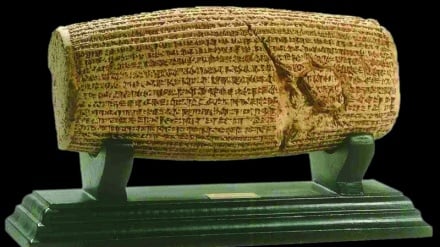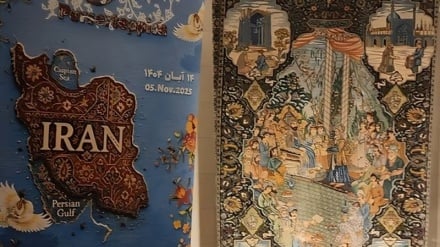Pars Today's Iran and world news package
From Saadi to Khayyam; Iraqis interested in Iranian poets + Introduction
-

An illustration of Saadi, the Iranian poet, and his mausoleum
Pars Today - Chairman of Baghdad Book Fair spoke of the Iraqis' high interest in the Iranian poets and writers.
Abdul Wahhab Al-Rādhi, Head of the Iraqi Publishers Union and Chairman of Baghdad Book Fair, noting that many of the Iranian poets and writers are famous in Iraq, said, "The Iraqi people like the great Iranian poet, Saadi and the Rubaiyyat of Khayyam very much." According to Pars Today, quoting from ISNA, Al-Rādhi, speaking at Tehran International Book Fair on Sunday, reiterated, "Different books come to Iraq such as historical, religious and [Islamic] cognitive ones.
This Iraqi cultural official said that he has attended Tehran Book Fair several times and added, "Tehran International Book Fair is much greater than Baghdad Book Fair. Tehran Book Fair is governmental and the government administers it, but Baghdad [Book] Fair is private and we have a smaller space to work in."
In response to the question, if the Iraqi publishers are intent to translate the contemporary Iranian literature (story or poetry) into Arabic, he said, "During our attendance at Tehran Book Fair, we will sign contracts to translate books into Arabic and cooperate more with [Iranian] publishers."
**
Abu Mohammad Moshref –eddine Mosleh ibn Abdullah ibn Moshref, with the pen-name of Saadi, was the renowned Iranian poet and writer of the 7th century AH. Among his famous epithets mention can be made of "Master of Eloquence", "King of Eloquence" and "Sheikh Ajall (Supreme Sheikh)". The beauty and fluency of his speech in poetry and prose has gained global fame. Saadi's lyrics on morality and Irfan (Islamic Gnosticism) are very beautiful and attractive. All his works, including poetry and prose, have been collected in a single book, but two of his works, namely, Golestan and Bustan, have also been published separately. Bustan is a work of poetry, but Golestan is a mixture of poetry and rhymed prose.
Bustan of Saadi or Saadi Nameh contains the trips and stories in the form of Masnavi or couplets and includes nearly 4000 lines.
This lofty work is composed of many proverbs and stories which are epic and deal with various issues on training the spirit and gnostic aspect. Among the positive merits, which have been addressed in this book, mention can be made of submission to God's will, moderation, moral training, love and affection, goodness to others, gratitude (to God), contentment and humbleness.
This lofty work consists of 10 chapters:
Chapter 1: Justice, prudence and viewpoint
Chapter 2: Being good to others
Chapter 3: Love, youth and exuberance
Chapter 4: Humbleness
Chapter 5: Satisfaction (with God's will)
Chapter 6: Contentment
Chapter 7: Training
Chapter 8: Gratitude for health (security)
Chapter 9: Penitence and right path
Chapter 10: Supplication and epilogue
**
Golestan of Saadi, which in the view of many experts, is the most effective prose work in Farsi literature, consists of 8 chapters. Most of the accounts of Golestan are brief and resemble short stories and didactic accounts.
Chapter 1: About the behavior of kings
Chapter 2: About the conduct of the poor
Chapter 3: About the merit of contentment
Chapter 4: About the benefits of silence
Chapter 5: About love and youth
Chapter 6: About weakness and oldness
Chapter 7: About the impact of education
Chapter 8: About the codes of speech
**
Hakim Abul-Fat'h Omar ibn Ibrahim al-Khayyami, known as "Khayyam", was an Iranian philosopher, mathematician, astronomer and poet who was born in 439 AH in Neishabur. Khayyam was a genius and, with a very strong memory, he become a polymath as he was master of various sciences such as mathematics, astronomy, philosophy, religion, history, chronology and music. His broad fame caused his contemporaries to praise him with the epithets like Imam, Philosopher, Hojjat-ul-Haqq (Proof of God). Khayyam's Rubaiyyat (book of quatrains) is famous all over the world as it has been translated in many languages.
RM/MG


